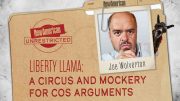
In an announcement posted to its blog on July 21, the Convention of States (COS) reported some details about the “over 350 amendment proposals” they received from people in 41 (“nearly all 50”) states.
“In preparation for Convention of States Foundation’s Simulated Convention, we solicited proposed amendments from you, our dedicated grassroots army. Your grassroots proposals will be shared with the commissioners attending the Simulated Convention scheduled for August 2-4, 2023,” the group crowed in the opening paragraph of the post.
I’ve written about this “simulated convention” already, so click here and read all about that cockamamie kabuki play. Spoiler alert: They brag about how a guy portraying a certain Founding Father is going to be hanging out at the convention, but they forget to tell you that the Founding Father he’s portraying was against an amendments convention — and I show you the receipts!
Now, back to the blog post and the highlights of the proposed amendments that might or might not be proposed at the simulated convention that will simulate a convention of states that might or might not happen.
I suppose COS is to be congratulated when you really think about it. Most groups would go out of their way to hide data that damage their agenda, but not COS. They lean into it. They use colorful pie charts to prove that the time being spent by well-intentioned Americans and the money being spent by well-funded COS lobbyists is all being wasted. That’s right. They are shining the light on the least favorable facet of their chimerical quest to fix the Constitution.
According to the information COS so colorfully included in the blog post, 40.9 percent of the amendment proposals they received focused on “limiting federal legislative power and/or jurisdiction.” Wait. That sounds like a good thing. We want to limit federal legislative power and/or jurisdiction too! So did the Founding Fathers. And they did. It’s called the Tenth Amendment.
The Tenth Amendment reads: “The powers not delegated to the United States by the Constitution, nor prohibited by it to the States, are reserved to the States respectively, or to the people.”
There you go. COS can stop spending millions of dollars misleading Americans into supporting a second constitutional convention. They want to put limits on federal legislative power and jurisdiction? Done. Mission accomplished, gentlemen.
Only COS doesn’t like the Tenth Amendment. I already wrote an article about that, too, but here are a couple of snippets from that earlier piece:
Convention of States (COS) is at it again. They’ve produced yet another document purporting to prove that nullification is not a remedy for federal tyranny. Here’s their latest attack on the 10th Amendment and state sovereignty taken from a document entitled “Is Nullification the Answer?”
The Tenth Amendment is a clear expression of a defining, foundational principle of the government designed by our Founders: that powers not delegated to the federal government by the Constitution are reserved to the states or to the people. But this, in and of itself, does not imply that individual states have the authority to independently determine when the federal government has acted outside the scope of its authority; much less does it imply that an individual state, upon reaching this conclusion, may simply ignore a duly-enacted federal law. The Tenth Amendment establishes a principle, but it does not establish a remedy or process.
And:
Next, with regard to exactly who is to have the final say on whether an act of the federal government has exceeded the authority granted to it by the states in the U.S. Constitution, the COS document says:
The Supreme Court — not an individual state — has the final say in whether or not the federal government has acted outside the scope of its authority under the Constitution.
They really said that. Go read the article. It’s worse than you imagine.
Do you see where I’m going with this? Convention of States is admitting that nearly 41 percent of the suggested amendments sent into them wanted to place limits on Congress’ power to legislate and on its jurisdiction. Not only does the very structure of the Constitution already do that very clearly, but the Founding Fathers decided to draw clearer, brighter lines around federal lawmaking authority and jurisdiction by enacting the Tenth Amendment.
Convention of States, however, doesn’t like that Congress ignores the boundaries of the Constitution as ratified, as well as the additional limits imposed by the Tenth Amendment. Neither do we. The difference is that we realize that if federal lawmakers already ignore the “few and defined” powers granted to them in Article I, and they ignore the limits laid out in the Tenth Amendment, then they would do likewise to any other amendment that purported to do what Article I and the Tenth Amendment were designed to do.
Lest you think I’m ignoring some critical part of the proposed amendments that would exculpate COS from the charge of trying to sell you what you already own, I’ll share this last detail from one of the pretty pie charts published by COS.
In revealing just how these proposed amendments would go about limiting federal legislative power and jurisdiction, the second COS pie chart indicates that that respectable but redundant task would be accomplished by: “add[ing] a new limitation on the federal government.”
I think we should apply COS’s approach to all our society’s ills. Let’s start with crime. Despite it already being against the written law in every state to steal the property of another, theft is committed every day in every state. But, thanks to COS, we can put an end to the stealing! All we have to do is convince state legislators in every state to pass another statute outlawing stealing! Just think: using the COS method, we can end crime and we can do it without a convention that might or might not destroy the Constitution as we know it.
After all, if we can prevent Congress from stealing our money just as soon as we “add a new limitation on the federal government,” then we can stop other crooks from stealing our property the same way.
Right?





